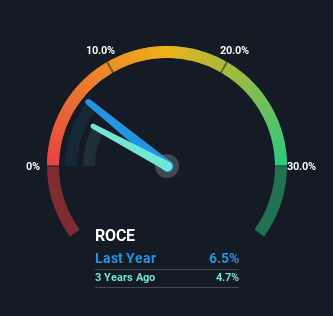- Japan
- /
- Construction
- /
- TSE:1950
Here's What's Concerning About Nippon Densetsu Kogyo's (TSE:1950) Returns On Capital

When we're researching a company, it's sometimes hard to find the warning signs, but there are some financial metrics that can help spot trouble early. Typically, we'll see the trend of both return on capital employed (ROCE) declining and this usually coincides with a decreasing amount of capital employed. Basically the company is earning less on its investments and it is also reducing its total assets. On that note, looking into Nippon Densetsu Kogyo (TSE:1950), we weren't too upbeat about how things were going.
Return On Capital Employed (ROCE): What Is It?
Just to clarify if you're unsure, ROCE is a metric for evaluating how much pre-tax income (in percentage terms) a company earns on the capital invested in its business. To calculate this metric for Nippon Densetsu Kogyo, this is the formula:
Return on Capital Employed = Earnings Before Interest and Tax (EBIT) ÷ (Total Assets - Current Liabilities)
0.065 = JP¥14b ÷ (JP¥269b - JP¥54b) (Based on the trailing twelve months to December 2024).
So, Nippon Densetsu Kogyo has an ROCE of 6.5%. In absolute terms, that's a low return and it also under-performs the Construction industry average of 8.9%.
View our latest analysis for Nippon Densetsu Kogyo

Above you can see how the current ROCE for Nippon Densetsu Kogyo compares to its prior returns on capital, but there's only so much you can tell from the past. If you're interested, you can view the analysts predictions in our free analyst report for Nippon Densetsu Kogyo .
What Can We Tell From Nippon Densetsu Kogyo's ROCE Trend?
In terms of Nippon Densetsu Kogyo's historical ROCE movements, the trend doesn't inspire confidence. About five years ago, returns on capital were 8.6%, however they're now substantially lower than that as we saw above. On top of that, it's worth noting that the amount of capital employed within the business has remained relatively steady. This combination can be indicative of a mature business that still has areas to deploy capital, but the returns received aren't as high due potentially to new competition or smaller margins. If these trends continue, we wouldn't expect Nippon Densetsu Kogyo to turn into a multi-bagger.
Our Take On Nippon Densetsu Kogyo's ROCE
In summary, it's unfortunate that Nippon Densetsu Kogyo is generating lower returns from the same amount of capital. And long term shareholders have watched their investments stay flat over the last five years. Unless there is a shift to a more positive trajectory in these metrics, we would look elsewhere.
Nippon Densetsu Kogyo does have some risks though, and we've spotted 1 warning sign for Nippon Densetsu Kogyo that you might be interested in.
While Nippon Densetsu Kogyo isn't earning the highest return, check out this free list of companies that are earning high returns on equity with solid balance sheets.
Valuation is complex, but we're here to simplify it.
Discover if Nippon Densetsu Kogyo might be undervalued or overvalued with our detailed analysis, featuring fair value estimates, potential risks, dividends, insider trades, and its financial condition.
Access Free AnalysisHave feedback on this article? Concerned about the content? Get in touch with us directly. Alternatively, email editorial-team (at) simplywallst.com.
This article by Simply Wall St is general in nature. We provide commentary based on historical data and analyst forecasts only using an unbiased methodology and our articles are not intended to be financial advice. It does not constitute a recommendation to buy or sell any stock, and does not take account of your objectives, or your financial situation. We aim to bring you long-term focused analysis driven by fundamental data. Note that our analysis may not factor in the latest price-sensitive company announcements or qualitative material. Simply Wall St has no position in any stocks mentioned.
About TSE:1950
Nippon Densetsu Kogyo
Operates as a railway electronics equipment construction company in Japan.
Proven track record with adequate balance sheet and pays a dividend.
Market Insights
Community Narratives




